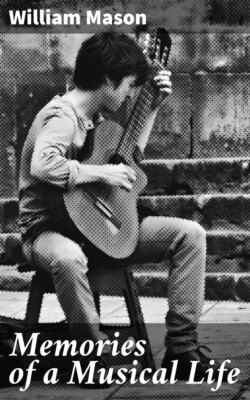Читать книгу Memories of a Musical Life - William Mason - Страница 13
На сайте Литреса книга снята с продажи.
"FATHER HEINRICH"
ОглавлениеTable of Contents
SOMEWHERE about this time there lived in New York an elderly German musician and composer who had somehow gained the cognomen of "Father Heinrich." He composed quite a number of large works, both vocal and instrumental, and also a number of pianoforte pieces. During a visit which he made to Boston, his headquarters were at Chickering's pianoforte warerooms, and on one occasion I was presented to him as a youth of some musical promise. He immediately showed me one of his pianoforte pieces in manuscript, and said: "Young man, I am going to test your musical talent and intelligence and see if you appreciate in any degree the importance of a proper observance of dynamics in musical interpretation." He had placed the open pages of the manuscript on the pianoforte desk, and I was glancing over them in close scrutiny. "I wish to tell you before you begin to play that I have submitted this piece to two or three of the best musicians in New York and they have failed to bring out the intended effect in an important phrase." This remark put me at once on my guard, and while he was talking I was closely scrutinizing the manuscript to see if there was some dynamic or other mark which would reveal his intention. About half-way down the second page I discovered a series of sforzando marks, thus: > > > > > over several notes in one of the inner parts, and immediately determined to bring out these tones with all possible force. Further than this there seemed to be no peculiarity; but as he had by this time finished his remarks I began to play with special care. The piece was easy to read, and so I made good progress, and on coming to the passage referred to I put a tremendous emphasis on the tones marked sforzando, playing all of the other voices by contrast quite softly. To my boyish satisfaction I found I had hit the mark. The excitement and pleasure of Father Heinrich was excessive and amusing. "Bravo! bravo!" he cried. "You have great talent, and you have done what none of our musicians in New York have accomplished!"
I did not at the time understand how he could lay so much stress on the affair, but in the light of a long experience as teacher of the pianoforte I no longer wonder at his excitement. All music is full of nuances and accents of greater or less intensity, to which pupils hardly ever give any attention, although they are necessary in order to give due expression to rhythm. They correspond to vocal accents in reading aloud, or in declamation.
